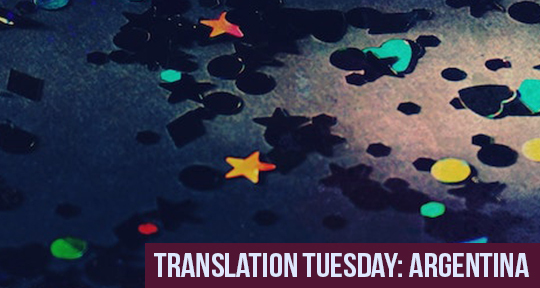Disease brings life into sharp focus and shades last moments with a hazy, but resolute acceptance in Clara Muschietti’s Tachycardia. Elegantly translated from the Spanish by Samantha Cosentino, the following Translation Tuesday is a strikingly honest portrayal of coming to terms with all that is unknown and unfinished in the face of an absolute end.
1
There can’t be wind stronger than this.
Outside, the leaves stirred up. Inside,
the certainty—all of this will come to an end.
We leave, at one point we’ll go. And for now,
we just leave most of our dark mane in a modern hair salon. We didn’t want to.
We don’t know whether to stay or run away,
we don’t know if you were lying.
We don’t know if we were lying.
That cat follows me indiscriminately, we
thank him so much
but he thanks us for domesticating him.
We think about the worst diseases,
and cry,
we meticulously inspect our body
we survey it with an unscientific rigor
we’re already certain
we will die
If we live to be old women we’ll be grateful.
If the sun comes out tomorrow we’ll be grateful.
If this home doesn’t fall apart tomorrow, we’ll be grateful.
The body weighs less—we attribute it to the disease we attribute to ourselves.
The more fear we have, the more we love life.
A few human figures in the distance,
I can’t make anyone out—there are no names
or birthdates—are they my brothers?
Up really close, faces warp,
become accessible.
Your face is there, when I wake it’s there, when I lie down it’s there,
when I’m sleeping it’s there. Your face from afar.
My body from afar feels
irreconcilable. The images you gave me
distracted me—we looked truly happy.
Up close I’m me. From afar I look like my mother.
We can’t know if this will last, we can’t
know until which day,
at which exact hour we’ll say goodbye.
We’ll go down one day for good,
we don’t know which. Hopefully it’ll be sunny
and we’ll be all grown up.
There can’t be sunshine stronger than this.
My skin turns red, my heart already was.
Now we all look grown up, mother,
and you don’t look like the one from the photos.
We still try to sense ourselves in those people who don’t live long.
Truth about the heart is improbable.
I don’t know if at night, when I’m alone
in bed, and I have tachycardia, I don’t know if it’s that
or if it’s the echo of my life rolling in the silence.
There isn’t ground more solid than this.
Drop your body to the earth.
Flush with the world, all feet are too alike.
You entered the room and said to me “you’re asleep”
I wanted to tell you that I was worn out, but it didn’t seem prudent. I pretended to sleep.
You walked away very slowly, without making a sound, as if
denying life itself.
I wanted to thank you for it but had to stay asleep, if not you would’ve thought you failed. Sleeping in the afternoon means something different.
Translated from the Spanish by Samantha Cosentino
Clara Muschietti was born in 1978 in Buenos Aires. She is a photographer and poet. Clara has led poetry workshops since 2009. She has published the poetry collections La campeona de nado (winner of an iROJO prize, 2007), Karateka (El fin de la noche, 2010), Podría llevar cierto tiempo (Bajo la luna, 2015), No sé qué creíste (ediciones aguadulce, Puerto Rico, 2016), Karateca/La canción que cantás (Ediciones Nebliplateada, 2020), Podría llevar cierto tiempo (Caleta Olivia, 2020), La vida normal (winner of the Ediciones Overol contest, Chile 2021), and This could take some time (Eulalia Books, 2022). She has been awarded various creation grants from national institutions for the arts.
Samantha Cosentino was born in Buenos Aires and raised in San Francisco. She most recently taught Creative Writing at SFSU. Samantha earned an MFA in Literary Translation and works in education in California. She was a Gita Specker Monologue Award Winner and an Audre Lorde Poetry Award finalist. Her poems have appeared in New American Writing and elsewhere in print and online journals.
***
Read more from Translation Tuesdays on the Asymptote blog:

